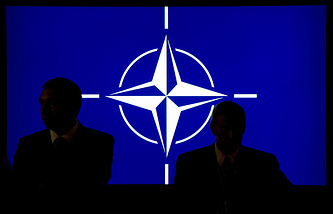NATO Propaganda Promotes War, Military Spending

Third in a four-part series on the 70th anniversary of the North Atlantic Treaty Organization.
The first two installments of the series showed how NATO was set up to blunt the European left and to justify European/North American dominance across the globe. Recently, the alliance has intensified pressure on Canada to increase spending on the military and participate in more wars.
As its Cold War pretext fades further from view, NATO has become more belligerent. In 1999 Canadian fighter jets dropped 530 bombs in NATO’s illegal 78-day bombing of Serbia. During the 2000s tens of thousands of Canadian troops fought in a NATO war in Afghanistan. In 2011 a Canadian general led NATO’s attack on Libya in which seven CF-18 fighter jets and two Canadian naval vessels participated.
In a dangerous game of brinksmanship, NATO has massed troops and fighter jets on Russia’s border. Five hundred Canadian troops lead an alliance mission in Latvia while the US, Britain and Germany head missions in Poland, Lithuania and Estonia. Over the past decade Canadian naval vessels have almost constantly engaged in NATO patrols in the Mediterranean and Indian Ocean.
In addition to spurring deployments and war, militarists use the alliance to boost socially and ecologically damaging military spending. “Canada’s defence spending questioned at NATO parliamentary meeting”, noted a November CBC headline while a National Post editorial bemoaned “Canada’s continuing failure to honour our pledge to NATO allies to spend 2 per cent of GDP on defence.” In 2006 NATO countries adopted a pledge to put 2% of economic output into their military.
NATO has also been used to push weapons procurement. Calling for expanding the jet fleet, senior military officials told the Globe and Mail in 2017 that “Canada’s fighter fleet is not big enough to meet its NORAD and NATO obligations at the same time.” In a history of the first century of the navy Marc Milner describes a series of reports in the mid-1960s concluding that the Royal Canadian Navy was “too small to meet Canada’s NATO obligations” and should be expanded “to meet NATO and North American commitments.”
NATO has also been invoked to justify arming the US war machine. In 1967 the Prime Minister responded to calls by opponents of the war in Vietnam to end the Defence Production Sharing Agreement, the arrangement under which Canada sold the US weapons, with the claim that to do so would imperil NATO. Lester Pearson claimed this “would be interpreted as a notice of withdrawal on our part from continental defense and even from the collective defence arrangements of the Atlantic alliance.”
In 2017 the Justin Trudeau government “hid behind Canada’s NATO membership”, according to NDP foreign critic Hélène Laverdière, when it opposed international efforts to ban nuclear weapons. At a time when he made a big display about “suffocating” the (nuclear) arms race Pierre Trudeau justified nuclear tipped cruise missiles testing in Canada. In 1983 the Prime Minister said, “having declared our support for the two track strategy, Canada should bear its fair share of the burden which that policy imposes on the NATO alliance.”
NATO is a nuclear weapons club. These monstrous bombs have been “a fundamental component” of the alliance’s military planning. Through NATO Canada has effectively committed to fighting a nuclear war if any country breached its boundaries. Additionally, the alliance does not restrict its members from using nuclear weapons first.
NATO supports various militarist organizations in this country and operates a public diplomacy division. Founded in 1966 the NATO Association of Canada, formerly Atlantic Council of Canada, promotes the alliance. With an office in Toronto its staff and interns organize public events and publish different materials. A decade older than the NATO Association of Canada, the Canadian NATO Parliamentary Association seeks “to increase knowledge of the concerns of the NATO Parliamentary Assembly among parliamentarians.”
A number of Canadian organizations receive NATO’s largess. Conference of Defense Associations conferences in Ottawa have received support from NATO while the Canadian Global Affairs Institute has held numerous joint symposiums with NATO. The annual Halifax International Security Forum, which brings together hundreds of academics and policymakers, is sponsored by NATO. In the late 1980s the Canadian Institute for Strategic Studies had “agreements with NATO’s Information Service to conduct a national/regional speakers tour.”
In other words NATO spends money (which ultimately come from our taxes) to convince Canadians that wars and military spending are good for us.
*
Note to readers: please click the share buttons below. Forward this article to your email lists. Crosspost on your blog site, internet forums. etc.

